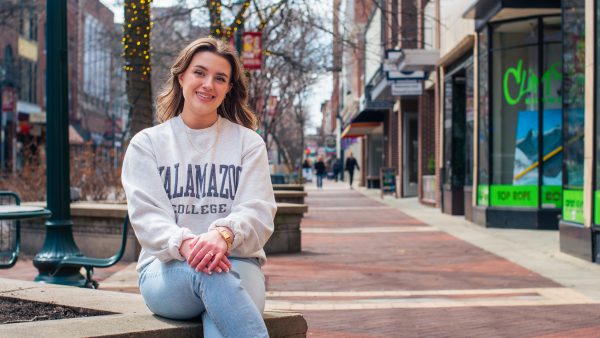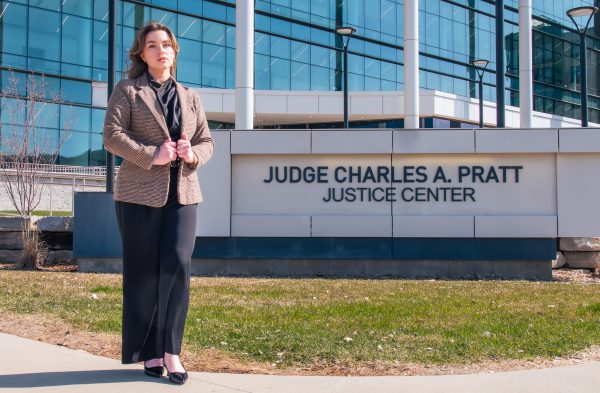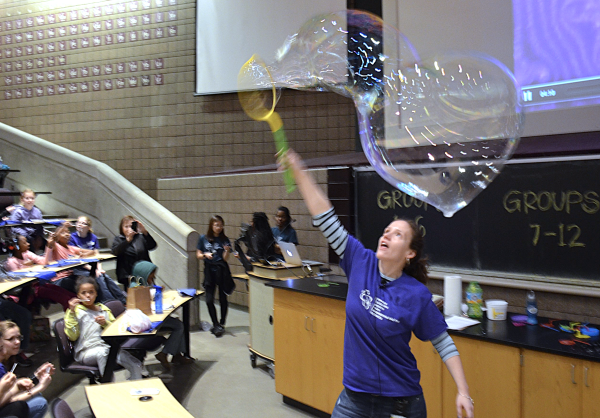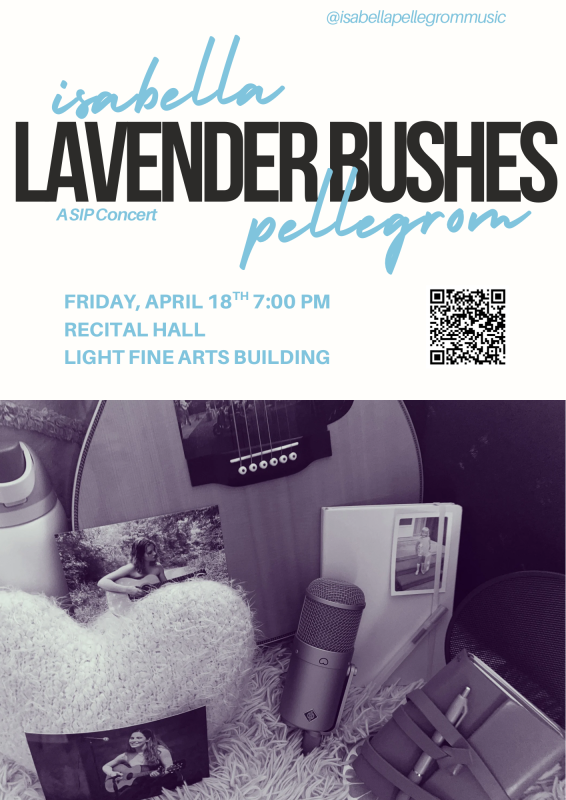Ariadne Markou ’25 will graduate in November from the dream school she never actually thought she would attend, in a field she didn’t anticipate studying, with a plan to pursue the one career she was sure was not for her.
A Kalamazoo Promise student, she dreamed of attending Kalamazoo College when she was young. In high school, however, she struggled with undiagnosed ADHD and her emotional health.
She took time off from school after graduation, working as a receptionist in a law firm, before starting classes at Western Michigan University.
“I wanted to be a cosmetic dermatologist, and I was asking my sister, who’s a science teacher, a lot of questions, and she was like, ‘Oh, these are biochemistry questions,’” Markou said. “So, I went to Western to major in biochemistry and Japanese.”
When biochemistry turned out not to be a good fit, she took another break from school. While considering a major in art or economics, she enrolled at Kalamazoo Valley Community College (KVCC), where she joined the honors program.
When a K representative visited the program, Markou saw a path back into her original dream. In fall 2023, she came to K as a 22-year-old transfer student.
“The honors program at KVCC was very writing intensive,” she said. “There was an emphasis on having connections with professors, and it was an experience like I’d never had before. Coming to K has been a great transition, because I still have the opportunity to write and to have connections like I did there.”
A paper she wrote at KVCC analyzing the “work for hire” doctrine and copyright law helped her overcome her child-of-lawyers resistance to the idea of being an attorney, a career that aligns well with the interdisciplinary approach offered by K.
“I loved the puzzling involved in the legal analysis, and I realized this is something that I’m passionate about,” Markou said. “I want to do everything, but I have one life. I would stay in school if I could, just to learn everything, because I would love to be a software engineer; I would love to do philosophy; I would love to do biochem and learn every language I could. I like how diverse of a field law is, because I could do medical malpractice one day and criminal defense the next.”


At K, Markou continued to study Japanese while selecting a major in anthropology/sociology and a minor in philosophy. While not officially fulfilling the requirements for a concentration in critical theory, she has taken as many classes in the program as possible and currently serves as the departmental student advisor.
Markou has packed maximum engagement into her compressed time at K. She participated in the Humanities Integrated Locational Learning (HILL) Project, traveling to San Diego to study the representational politics of art on the border, constructing and maintaining border identities, and how art makes community. She performed summer research with Nupur Joshi, assistant professor of anthropology and sociology, on legal considerations in the Mukuru informal settlements in Nairobi, Kenya. Markou also served on student government and is president of the law student organization.
Relationships have made her experiences possible and valuable.
“I’m grateful for the opportunities I’ve had,” Markou said. “My professors have been the biggest supporters, and I’m lucky to learn from such brilliant people. My life has been enriched, not just educationally or intellectually, but also personally. It’s awesome being in an environment where you hear so many different perspectives and have people who can call you on things and say, ‘Hey, that might not be correct,’ and do it with such dignity and respect that you know that you’re valued. I’m proud of the relationships that I have with my current professors, my family, my previous professors. It makes everything so worthwhile.”
When it came time to choose a Senior Integrated Project (SIP), Markou found herself reflecting on how her previous research into ownership and theft of creative work tied into timely conversations around generative artificial intelligence.
“I’ve always loved art and music, and I think there’s something irreplaceable when you’re engaging with works created by humans,” Markou said. “Thinking about AI generating these works was really unsettling for me.”
Markou researched and wrote a SIP in the anthropology and sociology department, titled “Creativity in the Age of AI: A Critical Examination of Artificially-Generated Works.” Under the guidance of her SIP advisor, Benjamin Kampler, assistant professor of anthropology, Markou delved into legal and social issues involved in the interplay of generative AI and the creative industry.
Her SIP examines the social and cultural value of creative expression and draws upon legal theories and copyright law to suggest potential improvements in American legislation to better protect creators. Throughout the process, Markou learned and struggled, found surprises and challenges, and leaned on input and support from family, friends and faculty.
Kampler and Markou joined the K community at the same time, and navigated the SIP process, new to both, together. Kampler helped particularly when Markou struggled to find sociological theories about art and met during the summer to review her work.
Markou’s lawyer parents offered feedback on the writing and terminology, and a former professor at KVCC agreed to read a draft and provide input. Markou’s partner, a computer engineer, shared his expertise, as did Alyce Brady, the Rosemary K. Brown Professor in Computer Science, and her husband, John. Their help proved vital, as one of the challenges that arose was that Markou does not have a background in computer science.
“It was frustrating at times, but I’ve long accepted that it’s OK to not get things the first time, so I treated the difficulty of not knowing about AI as an opportunity to learn,” Markou said.
Even for those with a computer science background, it can be hard to stay current with AI’s constant evolution—another challenge Markou faced, both in finding relevant resources and in shaping her own paper.
“AI is adapting and increasing so rapidly that articles are not publishing in the timeline that can keep up with it,” Markou said. “I ended up sticking to a lot of theoretical articles about AI; I can’t talk about specific developments because it will be outdated so quickly.”
Despite writing broadly, Markou acknowledges her finished SIP has probably already fallen victim to this trend. When she presents at the anthropology and sociology department’s Hightower SIP Symposium this spring, she plans to offer a disclaimer that her research may not reflect the current situation.
A less serious challenge, yet eminently relatable for K seniors and alumni: Formatting her paper to fit correctly in the SIP folder.
“Honestly, one of the craziest things was having to physically print it out and put it in the folder,” Markou said. “I was running around like a chicken with its head cut off, like, ‘Does anybody have a screwdriver? I need to take out part of this three-hole punch, because I need two holes.’”
As she learned about generative AI and expanded her knowledge on copyright laws, Markou was surprised to discover how inaccessible AI training databases are.
“I thought that training databases would have been a lot more transparent,” she said. “I thought it would be understandable, if people had the knowledge, computer engineers or computer scientists, I thought people in those fields would at least know, but they don’t. I ended my paper with a couple suggestions, and one of them was to have increased transparency on databases, because it allows artists to come forward and say, ‘Hey, my stuff was in here, and I didn’t agree to that.’ I really was put off by how hard the use of source materials was to see and understand.”
She also continued to develop in appreciation for creative work, from the Mona Lisa to improvised jazz to fan fiction.
“Art and creation have never been a means to an end,” Markou said. “There’s so much value in connecting with people, in stories being told. AI is great as the occasional assistive tool, but it has never been, and it will never be, a replacement for humanity. I’ll use ChatGPT to help explain things, but I would never ask it to write something for me, because there’s no me in that. I don’t care if my work’s perfect; I just want to be proud of it. I hope people see that there is such deep value in being an autonomous person existing in the world.”
Outside of her K-Plan, Markou works at the 9th Circuit Court in Kalamazoo and as a social media manager for a law firm, has been a youth board member at the Southwest Michigan chapter of the Red Cross, and skis (for fun now—she skied competitively when she was younger). She volunteers with Gentiva Hospice, visiting patients and even sitting with them as they pass away. That experience has helped her develop perspective.
“We only get one life,” Markou said. “I want to be an attorney, but what matters most is that I want to be content; that is my big goal in life. My dad always told us, ‘It doesn’t matter what grades you get; it doesn’t matter if you get the highest paying job; I just want you to live a life surrounded by things that you love,’ and I try to live my life that way.
“I’m proud of myself for finding this path. It was hard to get here, and here I am. I’m figuring this out. I am so grateful for that.”













